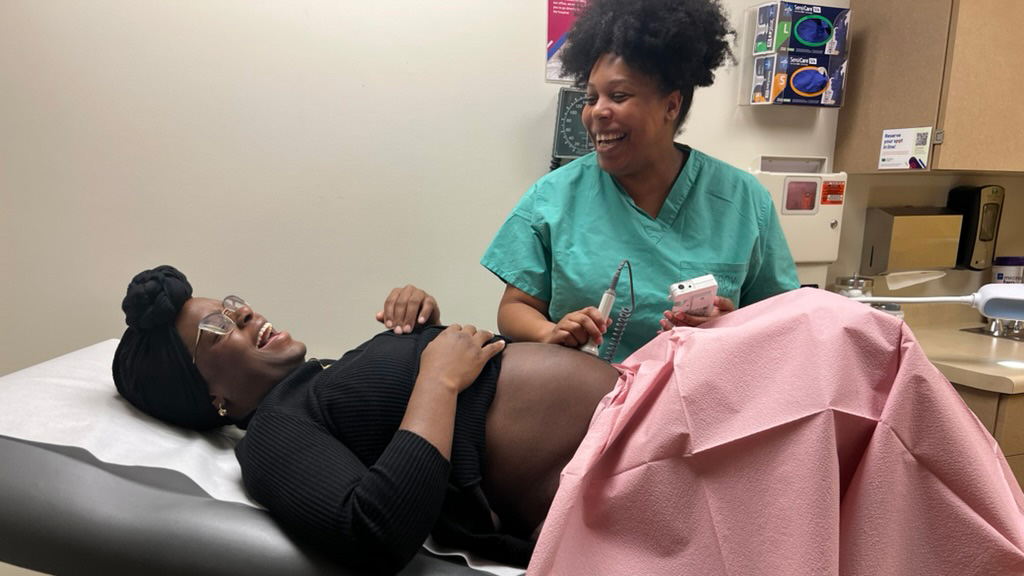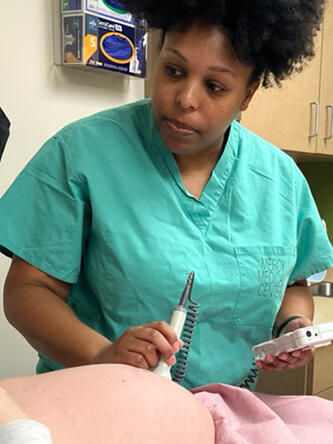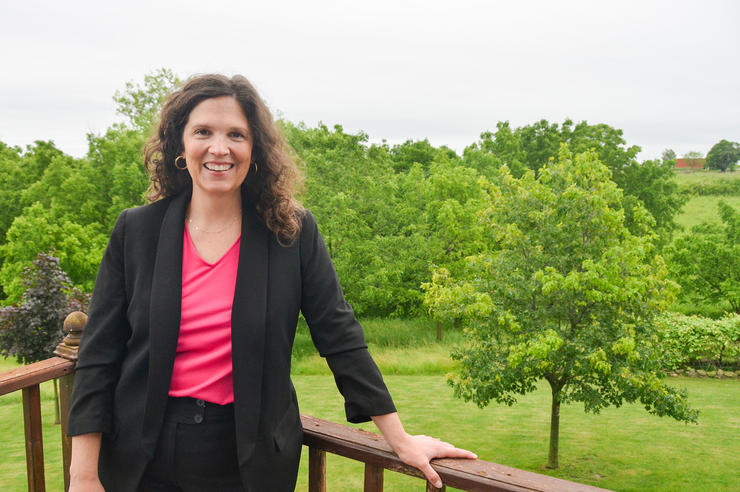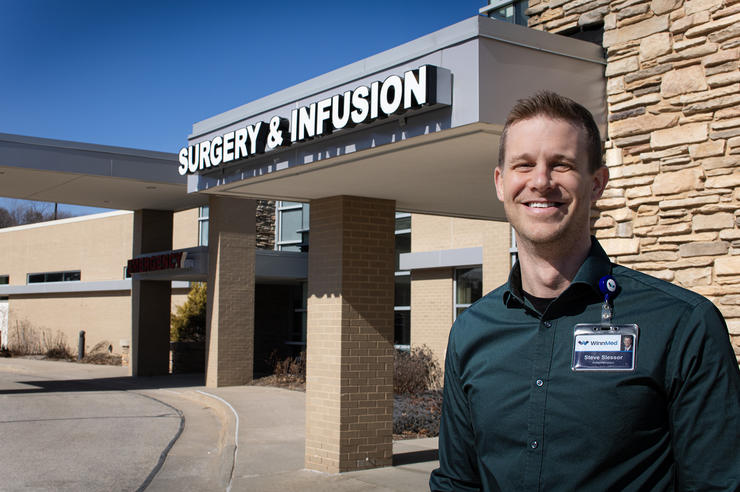Carr provides care for community where she was born

Through her parents, University of Iowa Carver College of Medicine graduate Wanakee Carr learned at a young age that her education would be a means by which she could support her community.
“My family always encouraged me to use my skills because they didn’t want me to worry for anything,” says Carr, who grew up in Des Moines, Iowa. “Being a Black female, my family wanted me to be in a career that was respected. Since I liked science and had an interest in medicine, they encouraged this.”
She admired her family physician, Rochelle Levy, DO, who delivered her and cared for her throughout childhood.
“When I went to my annual appointments, and when I was sick, we would talk about being a doctor,” Carr says. “She was my first role model.”
Carr now fulfills that role practicing obstetrics and gynecology (OBGYN) in the Des Moines area — work that she didn’t expect would become her calling when she first started medical school.
“That was purely by accident. I did not go into medicine thinking I was going into obstetrics and gynecology at all,” she says.
‘It’s such a beautiful experience’
Carr started medical school with an interest in orthopedics, but like a lot of medical students, her experience in rotations revealed her true interests and skills. Ultimately, an obstetrics rotation in her third year of medical school made all the difference.
“My first day on obstetrics, Megan McDonald [MD, MHPE] and Mark Santillan [MD] were like, ‘Hey, do you want to do this delivery?’” Carr remembers.
Under the supervision of UI alums Santillan and McDonald, Carr “caught a 35-weeker” — the first baby she would deliver in a career full of moments like this.
“They were right there. I knew they wouldn’t let anything go wrong,” she says. “I felt supported enough in that moment to have that experience.”

In terms of short-term career goals, Wanakee Carr says she wants to continue in advocacy roles in the community and use her voice to help others so that when they go to their doctor, they feel empowered. “And in the clinic, I just want to continue to practice great medicine,” Carr says.
Helping bring a new child into the world ignited a passion that became the career Carr has today. She considered specializing in general surgery, for which she had an aptitude, but ultimately, she couldn’t imagine herself giving up labor and delivery.
“It’s such a beautiful experience,” Carr says. “Patients are putting a lot of trust in you to deliver a child. It is a beautiful thing to see a kid take their first breath and cry and scream and all the emotions of the family. Even to this day, it’s awesome.”
While she was finding that passion in medicine, though, Carr’s family was going through a difficult period. Her mother was seriously ill with an autoimmune condition called primary sclerosing cholangitis and needed a liver transplant. It became difficult for Carr to prioritize the education she had worked so hard to achieve.
“When I was in my second year, she was back and forth between hospitals and rehab facilities,” she says. “It really affected my mood. I chose to take a little bit of time to make sure that I was in a good space to complete my medical school training.”
Faculty and staff in the Carver College of Medicine worked with Carr to reduce her schedule, and she worked in a research lab part-time.
“The university was so supportive,” she says. “They wanted me to be successful, but they understood that life circumstances can get in the way, and that my mental health had to take priority.”
Shortly after Carr returned to medical school full-time, her mother passed away.
“I was walking into a final when my dad called me,” Carr says.
Working with collegiate leaders, academic counseling, and mental health services, she created a plan to get her education back on track at a pace that allowed her the space she needed to grieve.
“As someone going into medicine, we’re very driven people. We have this pathway, and we don’t want to deviate from it,” she says. “I was concerned about whether this was going to affect my residency prospects. Between academic counseling and mental health counseling, they really helped me make that decision and feel OK about it.”
“I’m privileged to be in a space where I’m needed. When I hear that patients feel heard, seen, and cared for to the best of my ability, that means a lot to me.”
Finding meaning through advocacy
After residency training at the University of Kansas Medical Center, Carr returned to Iowa to practice in the Quad Cities with Genesis Health System. In that position, she served a large population of underinsured and underserved patients through a federally funded health care center. The work connected her to the increasing challenges that women in Iowa faced in accessing OBGYN care.
“We had patients from all walks of life going through various struggles,” Carr says. “But I feel like we gave those women really good care.”
Carr now maintains a busy practice with the Iowa Clinic, splitting her time between labor and delivery, gynecological surgery, and clinic visits. Due to dwindling numbers of labor and delivery units in the state, she often has patients who travel multiple hours for care.
“I’m privileged to be in a space where I’m needed,” she says. “When I hear that patients feel heard, seen, and cared for to the best of my ability, that means a lot to me.”
She also stays connected to her “why” in medicine through leadership and advocacy — a role she is familiar playing. Throughout her time at the University of Iowa, she was active in Undergraduate Student Government, the Black Student Union, and Graduate Professional Student Government. She also served as student body president in Carver College of Medicine Student Government.
Aside from showing her the value of having a voice where decisions are being made, she found that these activities helped her maintain balance during stressful times.
“Having that outlet kept me energized and passionate because I felt I was making a change,” Carr says.
Advocating for fellow students gave her the skills to advocate for patients and physicians. She serves as Iowa’s Early-Career Fellow for the American College of Obstetrics and Gynecology and board president for the Greater Des Moines chapter of the American Heart Association.
“Advocating not only for my OB patients, but also for other physicians and for education in the community, really keeps me going,” Carr says.
In her work with the American Heart Association, she shines a light on the connection between obstetric health and future heart health.
“People don’t realize how much your obstetric health can be a canary in a coal mine,” Carr says. “If you have preeclampsia or gestational hypertension, that sets you up for higher cardiovascular disease risk later on. I feel like I have a social responsibility to use my platform and knowledge to help others. This is part of my calling as a physician in the state.”
Her ambition in the next five years? Stay right where she is needed, in her home of Des Moines, Iowa.
“I want to continue in advocacy roles in the community and use my voice to help others so that when they go to their doctor, they feel empowered,” Carr says. “And in the clinic, I just want to continue to practice great medicine.”


